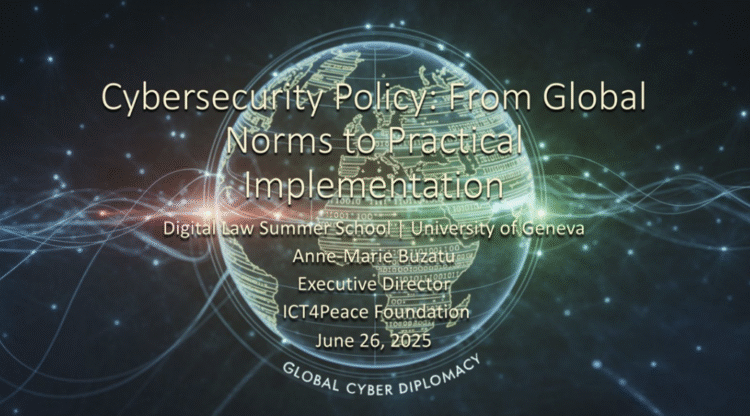
The ICT4Peace Foundation is proud to have partnered with the University of Geneva Digital Law Summer School to deliver an expert masterclass, “Cybersecurity Policy: From Global Norms to Practical Implementation.”
Led by our Executive Director, Anne-Marie Buzatu, this session equipped the next generation of legal, policy, and technology leaders with the tools to navigate the complex world of international cyber policy.
The course moved beyond theory, challenging participants to translate the UN’s framework of responsible state behaviour into actionable strategies for managing real-world cyber crises.
About the Course
In an era where cyber incidents can cripple national economies and endanger public safety, understanding the international rules of the road is more critical than ever. Yet, a significant gap often exists between the non-binding norms debated in diplomatic halls and the urgent decisions leaders must make during a crisis.
This course was designed to bridge that divide. Using a dynamic, interactive format, the course unpacked the essential elements of the global cyber policy landscape. Through a detailed analysis of the 2022 ransomware attacks on Costa Rica, participants explored the profound human and economic consequences of malicious cyber activity. The session then put them in the driver’s seat with a simulated crisis scenario, “The Gridlock Crisis,” where they stepped into the role of policy advisors to a head of state, tasked with applying international norms under immense pressure.
Key topics included:
- The crucial distinction between binding International Law and non-binding International Cyber Policy.
- A deep dive into the 11 UN Norms of Responsible State Behaviour, focusing on their practical application.
- The critical roles and responsibilities of the private sector and civil society in the implementation ecosystem.
- A forward-looking analysis of the UN’s permanent mechanism for ICTs and the future of global cyber diplomacy.
This course exemplifies the ICT4Peace Foundation’s commitment to building practical, human-centric cybersecurity capacity. By empowering future leaders with the skills to navigate both policy and practice, we contribute to a more stable, secure, and rights-respecting cyberspace for all.
